At the RIPE NCC, we tailor our engagement to the needs and abilities of each part of the community - all with the aim of making a meaningful impact on the Internet ecosystem. In this first in a series of quarterly reports, I look at the work we do in community engagement and how we measure outcomes and impact.
This will be the first RIPE Labs article I've published since becoming the RIPE NCC’s Chief Community Officer. The long wait hasn’t been due to a lack of words or thoughts on my part - those of you who know me in person know that I'm never in loss of either. But the transformational changes we've seen in the organisation since I took this role - and their impact on the work we do - led me to wait for the right moment.
In this article, I want to share some of the recent paradigm shifts in the way we approach community engagement at the RIPE NCC. And what's more, I want this to serve as a foundation for a series of quarterly reports on how the RIPE NCC’s community engagement activities are making a measurable difference in the Internet - or in other words, how we’re pushing the needle forward.
Making a measurable difference
Community engagement is at the heart of all we do at the RIPE NCC. As secretariat to the RIPE community, we’re here to serve its interests and to make sure everyone who takes part has a sense of belonging to one community fabric.
The RIPE community, like any community, shares a common set of objectives and interests, and we're held together by a need to collaborate and to communicate ideas with each other. As our community grows and diversifies, it is crucial to maintain focus on the basic common denominators that bring us together. Otherwise, there's always the risk that people will break off and disengage.
This is why it's key to hold various engagement activities throughout the service region targeting different audiences and topics related to local Internet development and the RIPE NCC’s mandate. This kind of engagement at the local level allows for the development of more engaged local communities who can then participate and be active members in the regional and global communities.
Why we do what we do
Prior to the RIPE NCC’s internal restructure in 2021, the community related roles, activities and budgets were spread across three senior managers. In an effort to bring more alignment across these activities, several departments and staff members were brought together under a single leadership.
The restructure came as an inaugural step for defining the RIPE NCC’s strategic plan 2022-2026. This meant my newly assembled team and I had an opportunity to shape the future of the organisation's engagement. Taking this opportunity to step back and reexamine what we want to achieve from our effort in community engagement, we started looking less at “what are we doing next” and rather “why do we do what we do?”. Starting from there allowed us to design and reorganise ourselves around purpose rather than activities and managers.
From this, three distinct purposes emerged that tied back to the strategic goals in the RIPE NCC’s strategic document.
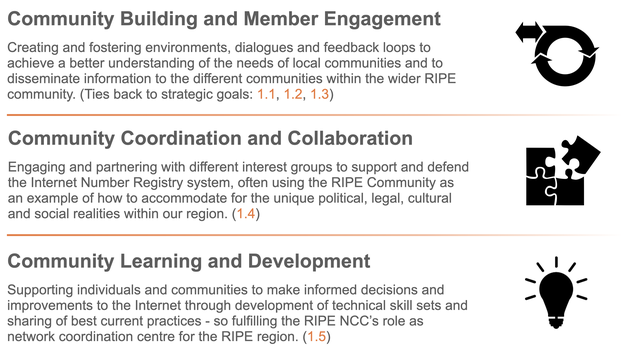
These purposes became the foundation of our activity plan and budget. If you are interested in hearing more, I gave a presentation about it at the RIPE 84 meeting in Berlin.
Armed with clear strategic objectives and a structure designed around purpose, what we really look for are ways to measure whether doing things that way will give us the results we want. It’s all about being able to measure execution against planning. And to do this in a systematic way, we’ve turned to the Objectives and Key Results (OKR) framework.
Community engagement programmes
The RIPE NCC is a non-profit membership organisation that supports the infrastructure of the Internet through technical coordination in its service region. In other words, unlike most companies, revenue from our operations can not be considered a measure for success. We needed to be able to measure if we could make a meaningful difference (impact) by engaging with the community we serve.
Adopting the OKR framework is an extremely useful way for us to map the different projects and activities we carry out across departments to the objectives laid out in our strategic document. Sets of activities that, in coordination with each other, contribute to the same objective are grouped into ‘programmes’. Then, for each programme, we come up with a set of measurable key results that we can use to determine whether its activities helped us achieve our objectives.
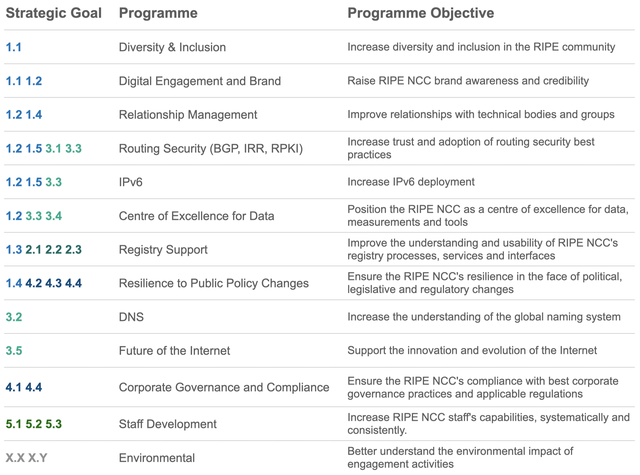
Note that the environmental programme does not correspond to any strategic goals in the strategic document. This programme was added to start collecting metrics and a baseline for better reporting and understanding of the environmental impact of our engagement activities.
What makes OKRs such a good fit for our organisation is that we want to measure how the community reacts to our engagements - whether they find them useful and worth the resources spent on them. As OKRs are outcome driven, we can then see how we push the needle forward in key strategic focus areas such as routing security or IPv6 deployment.
While our priorities as an organisation are set by management in the activity plan and budget, the key results of measuring success are put forward by the staff members who work closest to those activities, and who there have better insights into relevant metrics that reflect the desired outcomes. This approach makes sure everyone involved is part of the planning, execution and reporting.
The key results - characterised in terms of meaningful outcomes as opposed to simple ‘tick of a box’ outputs - are reviewed on a quarterly basis, allowing the organisation to remain focused on what matters. This also provides me with an easier way to report on our successes and measure how cost effective we are in achieving them.
Another useful aspect of the OKR methodology is the way it pushes toward more ambitious goal setting. The idea is to set moonshot goals and see how far you can go. If you end up achieving 100% of your set key results, then you have played it too safe. This comes in handy as we constantly try to push ourselves to do as much as we can.
Pushing the needle forward
And now for the part I have been waiting to share with you. Here I want to highlight a few relevant community engagement programmes, the key results we are using to measure their success, and some of the outcomes we have seen from the community as a direct response to our activities and engagements.
Programme: Routing Security (BGP, IRR, RPKI)
Routing Security is one of the top company priorities for the year. Our objective is to push the needle on deployment throughout our service region, increasing trust and adoption of routing security best practices.
As well as the extremely positive feedback we received from those who took our BGP security e-learning modules, we also see outcomes that are a direct result of our engagement.
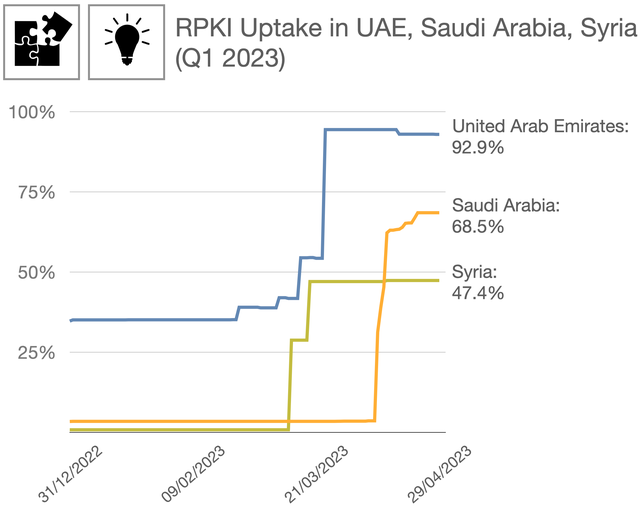
Focusing on RPKI adoption, we've seen particularly striking gains in Syria (0.8% - 47.4%), Saudi Arabia (3.4% - 68.5%) and United Arab Emirates (32.7% - 92.9%). These changes are the result of a variety of engagement activities we've carried out in these countries in recent months. This has included engagement with decision makers and political will stakeholders as well as technical learning and development activities targeting the technical employees of the large national operators. This tactic allows for all the planets to align where the political, decision makers and technical know-how are all supportive to make the move towards better routing security.
There is another key result on route origin validation (ROV), but you will have to wait till my upcoming quarterly update to hear how we are pushing the needle there.
Programme: IPv6
The objective behind this programme is simply to increase IPv6 deployment.
Another key result in this programme is to see how far we can push the needle of IPv6 deployment in three countries by developing three tailored engagement plans that factored in the country’s political will, sense of community (local synergy) and knowledge of IPv6.
In Turkey, the RIPE NCC organised a community meeting, alongside the RIPE NCC workshops on IPv6 and BGP security, to kick off a local Network Operator Group in the country.
In Kyrgyzstan, the RIPE NCC is planning an Internet measurements day promoting Internet measurement tools and presenting insightful statistics on IPv4 and IPv6 trends in the country and the region. The community meeting will also be accompanied by an IPv6 workshop to make sure that all parties who can push the needle forward have what they need to do so.
In Uzbekistan, The RIPE NCC has signed a memorandum of understanding (MoU) with the ministry of digital technologies of Uzbekistan, organised online webinars dedicated to operators in the country and has dedicated resources to help guide the deployment in the country. The plan is to have a double digit percentage of IPv6 traffic in Uzbekistan by the Central Asia Peering and Interconnection Forum planned to be hosted in this year as measured by APNIC Labs.
You can expect to hear more updates from this programme in future quarterly reports.
Programme: Centre of Excellence for Data
One of our other programmes that's also a top priority for 2023 is aimed at positioning the RIPE NCC as a centre of excellence for Internet data, measurements and tools. This programme serves two purposes at once:
- Internally, we are developing our data analysis capabilities so we can gain a better understanding of our diverse membership. This data-driven approach will allow us to offer improved support and make a greater impact in our engagement efforts.
- Externally, we focus on content generation for engagement.
One of the key changes that you can expect to notice from the RIPE NCC in this area is the improved attention to the data storytelling elements of engagement. Leveraging the data collected from various tools and platforms such as RIPE Atlas and RIPE RIS to create insights and RIPE NCC country reports.
These insights have proven extremely beneficial not only to the technical community but also to the policy makers as well as the media throughout the service region. A prime example of this would be the series of RIPE Labs articles published on the resilience of the Internet in Ukraine. This body of work was extremely useful and engaging during the RIPE NCC European Round Table held earlier this year.
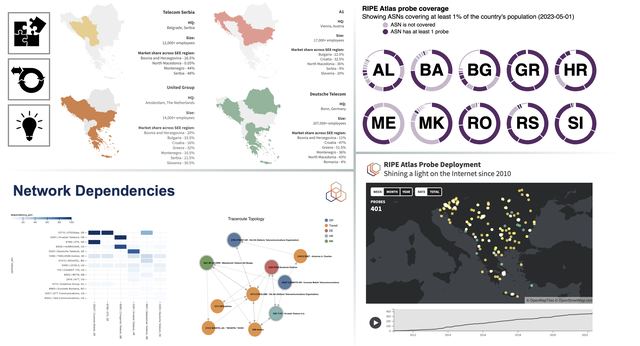
Another example of producing research material for the purpose of engagement is the research conducted for the RIPE NCC Regional Meeting in South Eastern Europe (SEE 11). This year one of the main attractions was the excellent research and the highly engaged panel that followed, on the evolution and trends of the telecommunications market in South East Europe. This body of work was a continuation of the reach conducted by the RIPE NCC last year for the same event to look into the history of the Internet in former Yugoslavia.
Running out of virtual ink
There is a lot more to share on our paradigm shifts in community engagement, the programmes we run, and how we measure success. By tailoring engagements to the specific needs and abilities of each community, we aim to make a meaningful impact on the Internet ecosystem. In future quarterly reports, I'll be providing more insights into our approach to community engagement and development, highlighting progress in our programmes and their OKRs.



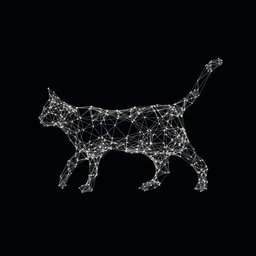

Comments 4
The comments section is closed for articles published more than a year ago. If you'd like to inform us of any issues, please contact us.
Željko Blaće •
What are the numbers and geographic distribution of not-for-profit network operators? I can imagine that academic, research and civil society network operators would be engaging more if they are explicitly addressed together.
Hisham Ibrahim •
I'm not entirely sure I got your question... However, the RIPE NCC has several activities for engagement with academics and researchers throughout our service region, such as RACI, free student tickets, sessions at universities fall under this. We also organise online and in-person academic sessions connected with each RIPE Meeting. Our in-house researchers also cooperate with universities all over our service region. You can read more from my colleague Gergana Petrova, our Community Development Manager: https://labs.ripe.net/author/gergana_petrova/community-development-plans-for-2023/
Michael Oghia •
Thanks for this, Hisham! I especially liked that OKR table, linking the goals to the programme objectives.
Hisham Ibrahim •
Thanks Michael for mentioning that. Indeed it required some work from my colleague Alena Muravska, our Programme Management Officer, and I to get the logical mapping done right to start the OKR process. I am sure you would also appreciate the addition of the environmental programme based on the feedback we heard from staff and community members including yourself.